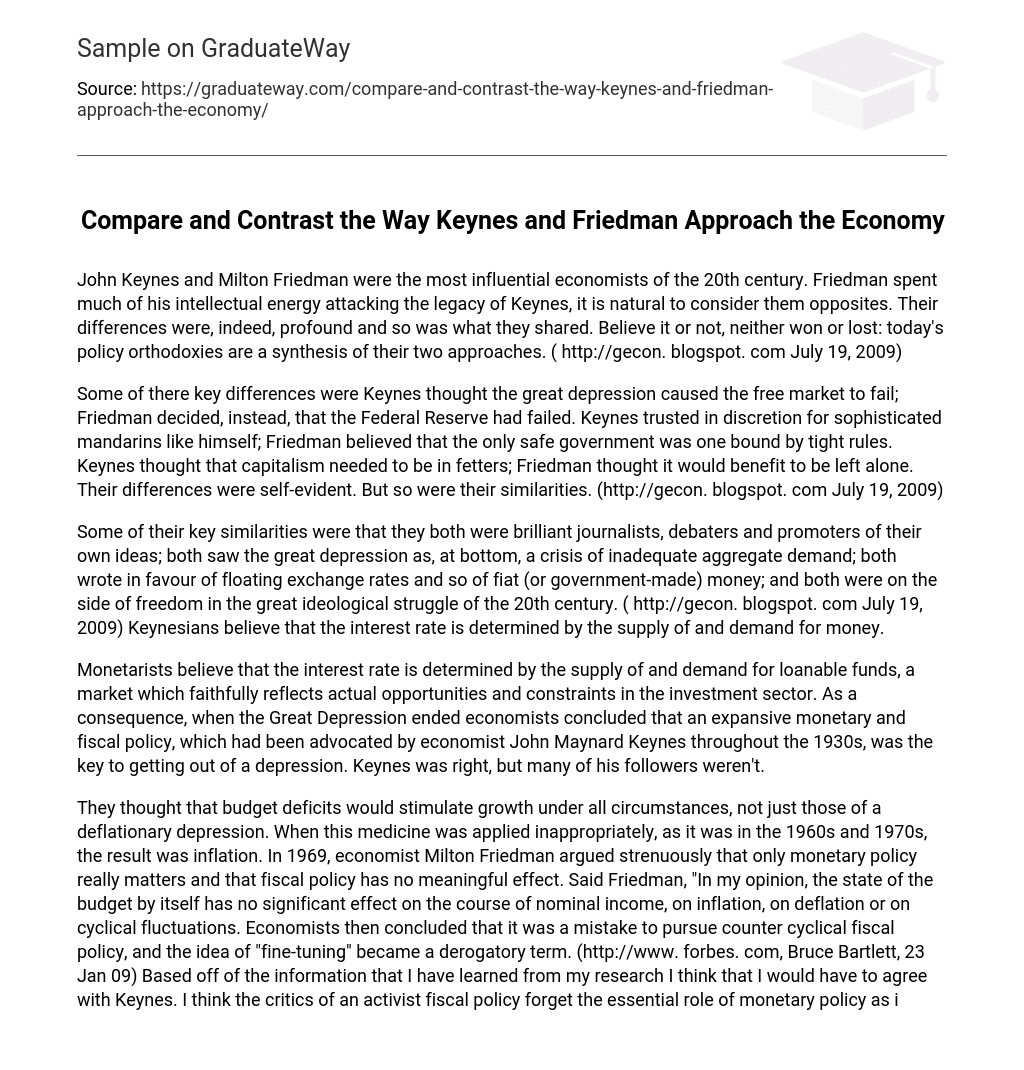John Keynes and Milton Friedman were the most influential economists of the 20th century. Friedman spent much of his intellectual energy attacking the legacy of Keynes, it is natural to consider them opposites. Their differences were, indeed, profound and so was what they shared. Believe it or not, neither won or lost: today’s policy orthodoxies are a synthesis of their two approaches. ( http://gecon. blogspot. com July 19, 2009)
Some of there key differences were Keynes thought the great depression caused the free market to fail; Friedman decided, instead, that the Federal Reserve had failed. Keynes trusted in discretion for sophisticated mandarins like himself; Friedman believed that the only safe government was one bound by tight rules. Keynes thought that capitalism needed to be in fetters; Friedman thought it would benefit to be left alone. Their differences were self-evident. But so were their similarities. (http://gecon. blogspot. com July 19, 2009)
Some of their key similarities were that they both were brilliant journalists, debaters and promoters of their own ideas; both saw the great depression as, at bottom, a crisis of inadequate aggregate demand; both wrote in favour of floating exchange rates and so of fiat (or government-made) money; and both were on the side of freedom in the great ideological struggle of the 20th century. ( http://gecon. blogspot. com July 19, 2009) Keynesians believe that the interest rate is determined by the supply of and demand for money.
Monetarists believe that the interest rate is determined by the supply of and demand for loanable funds, a market which faithfully reflects actual opportunities and constraints in the investment sector. As a consequence, when the Great Depression ended economists concluded that an expansive monetary and fiscal policy, which had been advocated by economist John Maynard Keynes throughout the 1930s, was the key to getting out of a depression. Keynes was right, but many of his followers weren’t.
They thought that budget deficits would stimulate growth under all circumstances, not just those of a deflationary depression. When this medicine was applied inappropriately, as it was in the 1960s and 1970s, the result was inflation. In 1969, economist Milton Friedman argued strenuously that only monetary policy really matters and that fiscal policy has no meaningful effect. Said Friedman, “In my opinion, the state of the budget by itself has no significant effect on the course of nominal income, on inflation, on deflation or on cyclical fluctuations. Economists then concluded that it was a mistake to pursue counter cyclical fiscal policy, and the idea of “fine-tuning” became a derogatory term. (http://www. forbes. com, Bruce Bartlett, 23 Jan 09) Based off of the information that I have learned from my research I think that I would have to agree with Keynes. I think the critics of an activist fiscal policy forget the essential role of monetary policy as it relates to fiscal policy. As Keynes was extremely clear about, the whole point of fiscal stimulus is to mobilize monetary policy and inject liquidity into the economy.
This is necessary when nominal interest rates get very low. Keynes called this a liquidity trap, and I believe there is enough evidence that we are in one today. I think that he was correct in asserting that expectations and confidence, which need not always be consistent with fundamentals in a world of uncertainty, can have a significant impact on economic fluctuations. Keynes said three things in the General Theory. First, the labour market is not cleared by demand and supply and, as a consequence, very high unemployment can persist forever.
Second, the beliefs of market participants independently influence the unemployment rate. Finally third, it is the responsibility of government to maintain full employment. I may change my opinion later on in this course but, as of right now I would side with Keynes. Keynes and Friedman were the protagonists of the policy debate of the last century. But today, we can see that neither won and neither lost. I find it very interesting that these two economists from the last century, are still to this day, being debated. These to were very smart and powerful economists.





